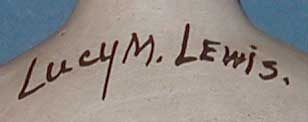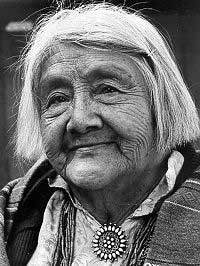 ClayHound Web
- Acoma Pueblo
Pottery
ClayHound Web
- Acoma Pueblo
PotteryReturn to:
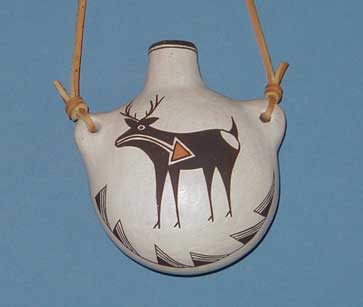 |
|
||||||||||||||
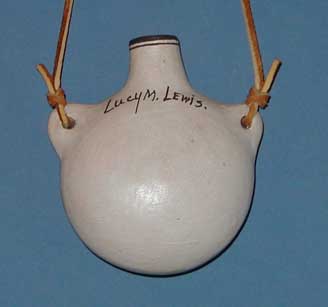 |
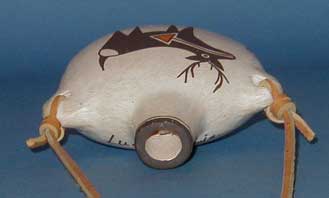 |
||||||||||||||
|
Lucy Lewis 1898-1992
Nationality: Acoma Pueblo PERSONALBorn: Lucy Martin, Sky City, Acoma Pueblo, New Mexico, c. 1898. Family: Married Toribio Luis (also known as Haskaya; died 1966). Career: Potter since adolescence; taught at Idyllwild School of Music and the Arts, Idyllwild, California. Awards: Numerous, including Maria Martinez Special Award, Santa Fe Fiesta, 1956; Indian Art Fund Award, 1958; first award, 7th Annual Amer-Indian Art Exhibition, Los Angeles, 1958; first prize Santa Fe Indian Market, 1960-61; |
|
||||||||||||||
|
Research Prize ("for overall excellence"), Indian Art Fund of the School of American Research, Santa Fe; six first prizes, five second prizes, two third prizes at the Inter-Tribal Indian Ceremonial; and First award, Scottsdale National Indian Arts Council, 1972; Governor of New Mexico Award for Outstanding Personal Contribution to the Art of the State, Santa Fe, 1983; Woman of Achievement Award, Northwood Institute, Houston, 1983; The Women's Caucus for the Arts (for her artistic accomplishments), 1992, Died: 1992. WRITINGS:INDIVIDUAL EXHIBITIONS
SELECTED GROUP EXHIBITIONS
COLLECTIONS
NARRATIVE ESSAY:Lucy Lewis learned to make pottery by watching other Acoma women, through observation and experimentation, rather than formal art training. Her work was first influenced by the sacred pots she saw in the kivas, which had traditional Acoma designs--parrots, flowers, and rainbows. Early in her career, Lewis, like many other Acoma women, frequently sold works to tourists along the highway. The clay of Acoma differs from that of some of the eastern pueblos, exhibiting a cream or buff color as opposed to the red clay used in Santa Clara, San Ildefonso, and other pottery-making centers, and ground potshards are used to temper Acoma clay for stability, rather than volcanic ash. Frequently, Acoma potters use shards from their own pots that have been destroyed during firing. Lewis, in contrast, used shards that she found on the ground, most likely Anasazi in origin. Lewis began to save the most interesting Anasazi shards, ultimately using them as inspiration for her work. She began to move away from traditional Acoma designs and to develop her own black on white fine-line hatch designs. A comparison of her black on white patterns with Anasazi pottery reveals the strong influence Anasazi styles had on her work. She ultimately became known for her "star-burst" pattern, which consisted of fine black lines on a white background. It wasn't until the late 1950s, when she visited the New Mexico Museum of Anthropology, that she had an opportunity to see examples of fully intact ancient pottery (and was surprised to find collections of her own work). Consequently, she developed her hallmark style with only small fragments of ancient pottery as inspiration. It is here that the skills of observation and experimentation she developed as a child facilitated the development of her unique style. Lewis produced her pottery in the traditional manner, digging and preparing the clay herself. Using large coils of clay, she built her vessels row by row, smoothing the coils as she progressed. After scraping and smoothing a vessel, she covered it with white slip made from watered down clay. Lewis painted her designs on the pot with a yucca brush. In applying the design, she placed the largest forms at the widest part of the vessel. She creates balance and rhythm in her patterns by the manipulation of design elements in relationship to the form. Her style is quite unique, employing all-over, fine-line linear designs. Although the patterns seem to be made of straight lines, they actually swell and contract to accommodate the contours of the pot. Lewis represents one of a handful of women from her generation that brought recognition to southwestern pottery through innovation and dedication to artistic traditions. Like Nampeyo, Maria Martinez and Margaret Tafoya, Lucy Lewis built upon ancient pottery styles in developing her own unique expression. Her influence on subsequent generations is still being realized, and it reaches beyond the boundaries of Acoma Pueblo. For seventeen summers she taught and demonstrated traditional Acoma pottery and firing at the Idyllwild School of Music and the Arts, California. She accumulated many awards and honors during her career. The Women's Caucus for the Arts honored Lewis for her artistic accomplishments by presenting her with an award in 1992. Lewis, who was ill at the time, was not present to accept the award. She received the medal at her home at Acoma, and she died a few weeks later. SOURCES:PUBLICATIONS ON LEWIS: BOOKS
PUBLICATIONS ON LEWIS: ARTICLES
http://www.nativepubs.com/nativepubs/Apps/bios/0426LewisLucy.asp?pic=none |
|||||||||||||||
